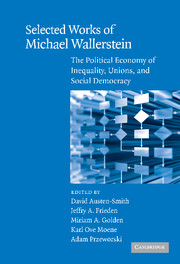 Selected Works of Michael Wallerstein
Selected Works of Michael Wallerstein Published online by Cambridge University Press: 27 January 2010
Michael Wallerstein's tragic death at the age of fifty-four deprived the world of one of its leading political economists. For twenty-five years Wallerstein had been in the forefront of rigorous analysis of the political economy of contemporary industrial societies. His research on relations between labor and capital, on labor organization, and on inequality and redistribution framed and advanced the study of central problems in modern politics and economics. This volume brings together Wallerstein's principal contributions, in the hope that their joint impact will demonstrate the scale of Wallerstein's achievement and advance the values that guided his life work.
Michael Wallerstein and Modern Political Economy
The modern study of political economy is quite recent. Forty years ago the term was barely used, and it was rare for scholars in the mainstream of the social sciences to study the interaction of political and economic forces. There were, to be sure, some scholars in the Marxist tradition, and others in the newer tradition of public choice theory, who analyzed aspects of the relationship between the economic and political systems. But there was no generally accepted field of political economy, and there was virtually no interaction between the two disciplines best suited to study it, political science and economics.
Today political economy is one of the most dynamic fields of investigation in both economics and political science, with a plethora of conferences and journals and handbooks of its own, displaying some of the biggest names in the social sciences.
To save this book to your Kindle, first ensure [email protected] is added to your Approved Personal Document E-mail List under your Personal Document Settings on the Manage Your Content and Devices page of your Amazon account. Then enter the ‘name’ part of your Kindle email address below. Find out more about saving to your Kindle.
Note you can select to save to either the @free.kindle.com or @kindle.com variations. ‘@free.kindle.com’ emails are free but can only be saved to your device when it is connected to wi-fi. ‘@kindle.com’ emails can be delivered even when you are not connected to wi-fi, but note that service fees apply.
Find out more about the Kindle Personal Document Service.
To save content items to your account, please confirm that you agree to abide by our usage policies. If this is the first time you use this feature, you will be asked to authorise Cambridge Core to connect with your account. Find out more about saving content to Dropbox.
To save content items to your account, please confirm that you agree to abide by our usage policies. If this is the first time you use this feature, you will be asked to authorise Cambridge Core to connect with your account. Find out more about saving content to Google Drive.